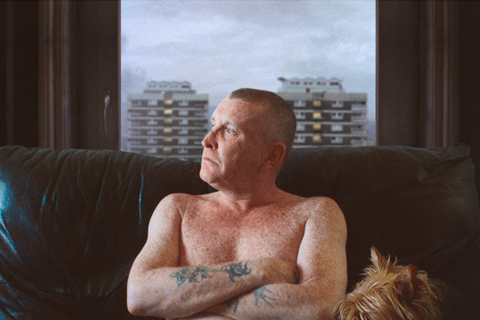The past casts a permanent shadow over a West Belfast housing estate in this CPH:DOX winner

Dir. Alessandra Celesia. France/Belgium/Republic of Ireland 2024. 115mins.
The Flats – or the New Lodge housing estate in republican West Belfast – is a place frozen in time and fear and anger in Alessandra Celesia’s CPH:Dox International Competition winner. The Truth and Reconciliation Commission mood music may imply closure, but The Flats is an eerie no man’s land where the pain of the past constantly leaks into the present, and foreshadows all its residents’ tomorrows.
A dark, uneasy reminder of the indelible, multi-generational stain of violence
Focusing largely on a single protagonist, Joe, whose childhood crashed when his uncle was murdered by the Shankhill Butchers in 1975, Celesia’s second documentary to be shot in the city after The Bookseller of Belfast is a dark, uneasy reminder of the indelible, multi-generational stain of violence. While its win at CPH will make this frank assessment of inter-generational despair a prestige must-see for programmers and retrospectives, its stark length will make it a harder commercial prospect, even at home in Ireland.
For Joe McNally, whose hard life is etched on his face as he traverses the Estate’s ‘unbowed, unbroken’ graffiti with his dog Freedom, the past is the present. The morning starts with estate stalwarts chanting decades of the Rosary in front of a small Grotto with Our Lady watching on. The night ends with Joe shouting from his high-rise terrace – where he proudly flies the Irish tricolour – at the drug dealers parading below. He has watched, he says, New Lodge turn from a ghetto into a slum. Either way, he has been its spiritual prisoner.
Celesia’s status as an outsider — this is largely a European-financed production and she is an Italian film-maker who splits her time between France and Belfast— has given her a freedom to take this as a starting point, and experiment. The Flats turns Joe’s story, and that of his neighbours and friends, into something more troubling by literally filtering the past onscreen, calling to mind Joshua Oppenheimer’s 2014 Oscar-winning The Act Of Killing.
Guided by a counsellor, Rita, who works in suicide prevention, Joe re-enacts that pivotal moment in his past by re-staging his uncle’s wake. Scenes of him dragging a coffin into a lift, draping it in a tri-colour, and even clambering inside, directly address the small boy who threw his first petrol bomb at the age of nine. (“It was exhilarating, it was fun,” recalls the man who still has a ‘Brits out’ sticker on his kitchen wall.)
Celesia shoots footage with a small red-headed boy who comes and goes, and drenches her archival shots in a blue wash. The present day, meanwhile, is harshly-lit, even though it’s haunted by that shadowy past. Joe refers to long-dead hunger striker Bobby Sands as if he were a physical presence in the room. He’s fond of referring to Sands’ letter from prison in which he claims “our revenge will be the laughter of our children”. Yet there’s no joy here over 40 years after Sands’ death, as Joe’s neighbours – including Jolene who also appeared in The Bookseller Of Belfast – grapple with a hard-scrabble life which includes caring for Jolene’s sister, permanently disabled from drug use.
For someone like Joe, the years go by in a fog of war and start to outspan those he spent in conflict: over the course of the film, he begins to understand the limitations of living in the past. Talented singer Jolene still lives a life dominated by the fallout from a war that ended in 1998. Celesia watches on as her subjects try to see an end to it, although they are still physically restricted by where they live and beyond – during marching season, for example, when gates are locked to preserve what is clearly still a fragile peace. They are damaged, with Joe’s faded tattoos and shambling gait a testament to the tolls taken on physical as well as mental health.
Obviously, being embedded in New Lodge makes this a film with a Republican perspective, although it is unlikely viewers will come away from this thinking any sort of politics is a good thing. This film is specific but universal and, with Catholics now outnumbering Protestants for the first time in Northern Ireland – and its assembly – food for thought for the future while also being a reminder of how difficult it is to banish the past.
Production companies: Films de Force Majeure, Thank You & Goodnight Productions, Planet Korda Pictures, Dumbworld
International sales: The Party Film Sales, sales@thepartysales.com
Producers: Jean-Laurent Csinidis, Geneviève De Bauw, Jeremiah Cullinane, John McIlduff
Cinematography: Francois Chambe
Editing: Frederic Fichefet
Music: Brian Irvine
























